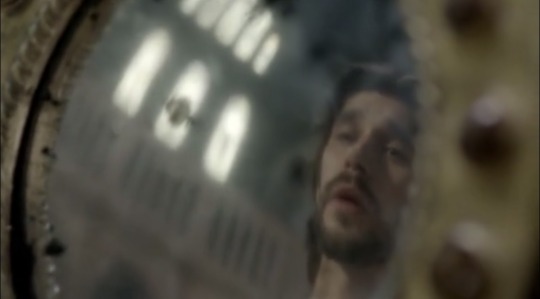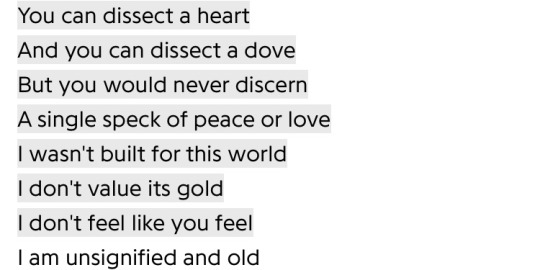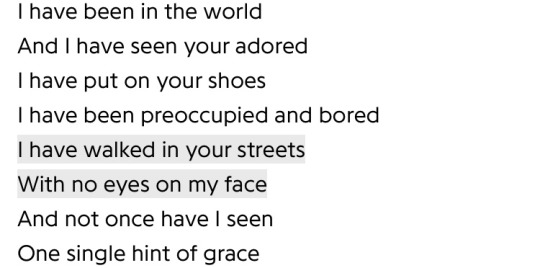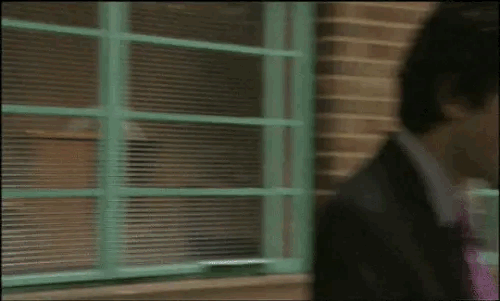#alack the heavy day/ that I have worn so many winters out/ and know not now what name to call myself. (from Richard II)
Text
December 5 (I'm still alive, promise, just swamped!) prompt - Recognition.
It was his skin, he was sure, had regenerated before, many times. But oh, it felt wrong, looking at once familiar things from a new height that now made them strange and unwelcoming. The shape of Adric’s shoulder under his hand, now too wide, and it surely couldn't only be that the boy was growing, they didn't change that quickly, did they? But perhaps they did, because Adric now shrugged away his touches, did not look at him for the same affirmations of pride as the Doctor remembered from his last regeneration. He wasn't sure if that hurt, or whether it was simply the disconnect between now and then, between who he definitely had been, and who he possibly could be now.
He was thankful it was at least not the outright hostility he faced from Tegan, the unhappiness underlying every tense motion, an anger that lay too close to the surface in any reasonable discussion he attempted to have with her. He could admit to himself, from a detached stance (ie, not in any proximity to Ms Jovanka) that he tended to feel the same angers, one of the very few noticeable emotions that seemed to stir in him these days. He knew feeling that anger toward her was not fair, that she had experienced more unhappiness in his presence than should have been experienced in such a short lifetime, but could not seem to help himself, and the sniping and abrasiveness let him feel more- well, personality than these scant days of existence had so far allowed him to. The Doctor (and he was the Doctor, wasn't he? the mirror didn’t answer him as certainly as it once did) wasn't sure he liked that aspect of himself. Days rather than hours now, and he still didn’t fit within his own skin, within his own TARDIS. His own name. So many seasons lived out, and he knew not what name to call himself.
The hardest he had come to find was neither oldest nor youngest, neither the lack of familiarity nor someone he saw uncomfortable flashes of himself (who he once was? who he could become?) in, but the most calm and quiet of them all. They had all suffered losses, and he should ache for all of them, feel blood pumping through what could be his hearts but that still felt too cold for such grief, but Nyssa had seen it done in the name and face of her father. Had seen what he had once been then take the hand of her father’s body and work with him. She had too much dignity to scream at him as Tegan did, he surmised, a scientist’s too strong a grasp on necessity being the mother of invention to condemn who he had once been for such an action. But, though still unadept at reading his own emotions, he could see in her eyes sometimes a distant fear that never translated itself to her voice, the recoil from his hands that had touched what had once been her father's.
Strange, he thought absently. Disappointment, anger, fear he could recognise in other’s faces. But then, perhaps, he had not yet had a chance to see joy, pride and comfort in the faces of those that travelled with him. Seconds, hours, days that ticked away and all he could be sure of, all that retained of his identity from the nebulous line of past and present was that time ticked away in his brain, in his hearts, with the surety it always would. Perhaps time would become kinder to the four of them, this disparate little group all so far away from home.
#fic#advent fic#five#tegan#nyssa#adric#yes this is what started as something else but morphed into how heartbroken i was that five's life starts off so heartbreakingly..... then#goes on to be heartbreaking and ends even more heartbreakingly. gosh why do i hold him so dear to my heart (always a weakness for the#tragedies)#it's the seventh i know i'm two days late!!! will try and catch up by writing and posting two more today/tonight but spent the 5th#babysitting then up till nearly 2 am getting ready for work the next day. got home from work on the 6th then fell asleep pretty much till#this morning. going out of town tomorrow with parents a sister and one of her sprog tomorrow so will also be hampered writing tomorrow too#also yes before i forget i did crib a line from richard ii. act 5 scene i??? yes it was. post his abdication to bolingbroke.#'Alack the heavy day / That I have worn so many winters out / And know not now what name to call myself'
7 notes
·
View notes
Text
having never had the opportunity to go mad over hamlet as a teenager in secondary school english lessons i can only comprehend what it did to other young homosexuals through my experience with richard ii
#no lord of thine thou haught insulting man. no. nor no man’s lord. i have no name no title. not that which was given me at the font for#‘tis usurp’d. alack the heavy day that i have worn so many winters out#and know not now what NAME to call myself!!#o that i were a mockery king of snow standing before the sun of bolingbroke to melt myself away in waterdrops…
2 notes
·
View notes
Text




“No lord of thine, thou haught insulting man, Nor no man's lord; I have no name, no title, No, not that name was given me at the font, But 'tis usurp'd: alack the heavy day, That I have worn so many winters out, And know not now what name to call myself! O that I were a mockery king of snow, Standing before the sun of Bolingbroke, To melt myself away in water-drops! Good king, great king, and yet not greatly good, An if my word be sterling yet in England, Let it command a mirror hither straight, That it may show me what a face I have, Since it is bankrupt of his majesty.” - King Richard II
#text#shakespeare#william shakespeare#king richard#king Richard ii#ben whishaw#acting#tv show#movie#bbc#male beauty#royalty#tv and film#oceancentury
12 notes
·
View notes
Text
Lacanian Junk
taken from the chapters, ‘Empty Gestures and Performatives Lacan confronts tha CIA plot’ and ‘The Interpassive Subject Lacan turns a prayer wheel’ from the book ‘How to Read Lacan’ by Slavoj Zizek,
available online at:
https://www.uploady.com/#!/download/ZRuvRbXyta8/T~b5aQoH_PSEXAR0
The empty gesture:
The most elementary level of symbolic exchange is a so-called ‘empty gesture’, an offer made or meant to be rejected. Brecht gave a poignant expression to this feature in his play jasager, in which a young boy is asked to comply freely with what will in any case be his fate (to be thrown into the valley); as his teacher explains, it is customary to ask the victim if he agrees with his fate, but it is also customary for the victim to say yes. Belonging to a society involves a paradoxical point at which each of us is ordered to embrace freely, as the result of our choice, what is anyway imposed on us (we all must love our country, our parents, our religion). This paradox of willing (choosing freely) what is in any case compulsory, of pretending (maintaining the appearance) that there is a free choice although effectively there isn’t one, is strictly co-dependent with the notion of an empty symbolic gesture, a gesture – an offer – that is meant to be rejected.
Something similar is part of our everyday codes of behaviour. When, after being engaged in a fierce competition for a job promotion with my closest friend, I happen to win, the “proper” thing to do is offer to withdraw, so that he will get the promotion, and the proper thing for him to do is reject my offer – this way, perhaps, our friendship can be saved. What we have here is symbolic exchange at its purest; a gesture made only to be rejected. The magic of symbolic exchange is that, although at the end we are where we were at the beginning, there is a distinct gain for both parties in their pact of solidarity. Of course the problem; what if the person to whom the offer to be rejected is made should actually accept it? What if, having lost the competition, I accept my friend’s offer to get the promotion after all, instead of him? A situation like this is properly catastrophic; it causes the disintegration of the semblance (of freedom) that pertains to social order, which equals the disintegration of the social substance itself, the dissolution of the social link.
In my perspective, don’t offer, you won fair and square, you can instinctually sense whether you’re good for the job, so can the boss who chooses the shit one as a challenge then like works you to the bone and shows you your depth. Yeah that betterment. This shit is like being admitted ‘voluntarily’ to the mental health ward for a drug induces psychosis. You can’t actually choose you have to say yes, they should just call it compulsory. It would be compulsory if you were a potential danger to others, it’s stupid that they offer ‘voluntary’. suicide is not legal in Australia, though I think it’s becoming legal in Europe. Believing that an ‘empty gesture’ is like a proper part of social interaction just makes you a puppet.
Symbolic castration and justice:
If a king holds a sceptre in his hands and wears the crown, his words will be taken as royal. Such insignia are external not part of my nature; I don them; I wear them to excerices power. As such, they ‘castrate’ me, by introducing a gap between what I immediately am and the function that I exercise (I am never complete at the level of my function). This is what the infamous ‘symbolic castration’ means; the castration that occurs by the very fact of my being caught in a symbolic order, assuming a symbolic mask or title. Castration is the gap between what I immediately am and the symbolic title that confers on me a certain status and authority. In this precise sense, far from being opposite of power, it is synonymous with power; it is what gives power to me. So one has to think of the phallus not as the organ that immediately expresses the vital force of my being, but as a kind of insignia, a mask that I put on, which gets attached to my body, but never becomes as organic part, forever sticking out as its incoherent excessive prosthesis.
Because of this gap, the subject cannot ever fully and immediately identify with his symbolic mask or title; the subject’s questioning of his symbolic title is what hysteria is about; ‘why am I what you’re saying that I am?’ Or, to quote shakespeare’s Juliet; ‘why am I that name?’ There is a truth in the wordplay between ‘hysteria’ and ‘historia’: the subject’s symbolic identity is always historically determined, dependent upon a specific ideological context. we are dealing here with what luois Althusser called ‘ideological interpellation’; the symbolic identity conferred on us is the result of the way the ruling ideology ;interpellates; us – as citizens, democrats, Christians. Hysteria emerges when a subject starts to question or to feel discomfort in his or her symbolic identity: ;you say I am your beloved – what is there in me that makes me that? What do you see in me that causes you to desire me in that way?’ Richard II is shakespeares ultimate play about hystericization (in contrast to hamlet, the ultimate play about obsession). Its topic is the progressive questioning by the king of his own kingship – What is it that makes me a king? What remains of me if the symbolic title ‘king’ is taken away?
No, not that name was given me at the font, bt ‘tis usurp’d; alack the heavy day, That I have worn so many winters out, And know not now what name to call myself! O that I were a mockery king of snow, standing before the sun of boilingbroke, to melt myself away in water-drops!
In the Slovene translation, the second line is rendered as: ‘why am I what I am?’ Although this clearly involves too much poetic licence, it does convey the gist of the predicament: depreived of its symbolic titles, richard’ds identity melts like a snowmans’ in the sun. the problem for the hysteric is how to distinguish what he or she is (his true desire) from what others see and desire in him or her. This brings us to another of Lacan’s formulas, that ‘man’s desire is the other’s desire’. For lacan, the fundamental impasse of human desire is that it is the other’s desire in both subjective and objective genitive: desire for the other, desire to be desired by the other, and, especially, desire for what the other desires.
Envy and resentment are a constitutive component of human desire, as Augustine knew so well – recall the passage from his Confessions, often quoted by Lacan, which describes a baby jealous of his brothers sucking the mothers’ breast: ‘ I myself have seen and known an infant to be jealous though it could not speak. It became pale, and cast bitter looks on its foster-brother.’ Based on this insight, jean-pierre dupuy proposed a convincing critique of john rawl’s theory of justice: in the ralws model of a just society, social inequalities are tolerated only in so far as they also help those at the bottom of the social ladder, and in so far as they are not based on inherited hierarchies, but on natural inequalities, which are considered contingent, not signifying merit.
What rawls doesn’t see is how such a society would create the conditions for an uncontrolled explosion of resentment: in it, I woul know that my inferior status is fully justified, and would be deprived of blaming my failure on social injustice. Pawls proposes a terrifying model of a society in which hierarcy is directly legitimised in natural properties, missing the simple lesson of a tale about a Slovene peasant who is told by a good witch: ‘I will do to you whatever you want, but I warn you, I will do it to your neighbour twice!’ the peasant thinks fast, then smiles a cunning smile and tells her: ‘take on off my eyes!’ no wonder that even today’s conservatives are ready to endorse rawls notion of justice: in December 2005, david Cameron, the newly elected leader of the british conservatives, signalled his intention to turn the conservative party into a defender of the underprivileged when he declared: 'I think the test of all our policies should be: what does it do for the people who have the least, the people on the bottom rung of the ladder?’
Even friedrich hayek was on the right track here when he pointed out that it is much easier to accept inequalities if one can claim that they result from an impersonal blind force. So the good thing about the ‘irrationality’ of success of failure in free-market capitalism (recall the old motif of the market as the modern version of an imponderable Fate) is that it allows me precisely to perceive my failure (or success) as ‘undeserved’, contingent. The very injustice of capitalism is a key feature that makes it tolerable to the majority (I can accept my failure much more easily if I know that it is not due to my inferior qualities, but to chance).
Lacan shares with Nietzsche and freud the idea that justice as equality is founded on envy: our envy of the other who has what we do not have, and who enjoys it. The demand for justice is ultimately the demand that the excessive enjoyment of the other should be curtailed, so that everyone’s access to enjoyment will be equal.
Afterthoughts::
I thought justice was more about place, and entitlement. Who is duly entitled to something, like if someone had their car stolen, it’s justice to retrieve the car from the undeserving thief. You paid for the car so you deserve it. What Lacan, Nietzsche and Freud are referring to is the flaw of seeking justice, false justice or something, letter of the law justice, justice in theory and not in necessary application, assimilation is numbing. ‘our envy of the other who has what we do not have…’ it should not be based on envy, but on necessity, ‘our necessity for what the other has, that we do not have’ regardless of whether the other enjoys or needs it, you may also.
You have to take into account appropriateness, and context, it’s a massive waste to have every resource at your finger-tips but no use for them, just for the sake of equality, people are unique and individual and have different needs and interests, this dictates what kind of enjoyment they deserve, as it is relevant to their unique chemical quality as an organism that is a part of a larger, synchronised web or order, you are a cog in the machine. Everyone plays their part, adds their unique contribution to the larger wheel of symbiotic cooperation. Everyone naturally has the access to every resource in the first place, how can it be real justice or equality based on envy. Also, rightly so, if the enjoyment of the other is specifically excessive. It HAS to be excessive, or else, it really would be nothing more than jealousy. They are talking about hysteric people who compare yards with their neighbour. Grass is always greener on the other side.
1 note
·
View note
Note
Re prompts! I’m pretty sure Nyssa is to me what Tegan is to you- ie favourite companion, beloved character, light of my life etc. Any moment with Nyssa in the aftermath of Logopolis- her entire world taken away from her- would be greatly loved by me <3
I shan't lie, I struggle to ever remember having thought of Nyssa as a lone character, outside of the units she's part of. So this was a bit tricky (and required much reference to her wiki page, a bit of fudging, and looping of the song Good King Wenceslas.) I hope it doesn't do her, or you, a disservice.
December 2nd - Nyssa.
She couldn’t sleep, the tranquillity she had come to expect of a Traken night interrupted by the breathing of the new traveller they had picked up, almost as strident in sleep as she had been awake, and that slight presence at the back of her mind - the TARDIS itself, she thought - happy and sad and a rainbow of emotions that she couldn’t find the names for but that came into being like small bubbles of feeling that tickled and burst in the back of her mind as the TARDIS reacted to whatever was being related to it, perhaps by the Doctor, perhaps by the outside world. Whichever it was, it was not Traken. Could never be Traken again.
She drew her borrowed nightgown around herself and padded to the door. If she couldn’t escape the noise in her own mind, she could at least leave behind the sighing and grumblings of a sleep she could not achieve mocking her. The corridors were cool and bright, clean lines that both reassured and made her ache for home. Castrovalva had had some of the same lines, perfection through cold mathematics, before it had begun to fall apart. Logopolis too, had shared that order before the Time Lords had intervened. Before this- before the Doctor had stolen a new face for himself. And she had watched, watched with the fascination of a scientist introduced to new data in a once predictable experiment, and knew it was not by the same method the Master had… chosen his new face, but she was wary of him in the same manner. There was nothing in these new eyes that echoed anyone she had known, but she had been frightened for a moment at the bottom of that tower that in those oversized clothing it would be her father again, her father with his same kind voice, saying such unkind and dreadful things.
Her feet had carried her past the living areas, past the door Adric had disappeared through self-importantly, past the kitchen they had all felt too awkward to take advantage of, as though the domestic necessity of making a meal was to diminish the catastrophic events of the day, to forget about the worlds that would never make their meals again. She, selfishly, she now admonished herself, had not been capable of assuaging their guilt in the matter, had been numb to the social conventions that had been instilled in her as the daughter of a consul.
She missed her teddy bears suddenly. Grief for the whole of Traken was too overwhelming to consider, the incomprehensible state of no longer being a daughter of her father, of no longer have a place to call her home were all too large to be thought of logically yet, needed more space, more peace than she was capable of gaining here to think about. But her teddy bears, tucked tidily away on her bed when she had completed her ablutions- yesterday morning? A lifetime ago? were no longer there. How could she sleep if she no longer had Big Bear to guard her safety? It had been silly, a child’s superstition she had been too old for already but had continued as tradition, but it was suddenly the most important thing that there should be something of her home to guard her. But all she had carried with her was her clothing, a comb and a bag.
A small bubble of grief rose in the back of her mind, and she didn’t know if it was herself or the TARDIS she was feeling. Or even perhaps, in a flight of unreality, the TARDIS was grieving for her, with her. Such a trivial thing, she knew, but still she mourned such childish superstitions she could never truly feel again, for all that the teddy bears had guarded was now lost, herself most of all. Another twinge redirected her feet, and now she knowingly allowed the TARDIS this, too tired, too numb of all but trivial sorrows to resist or fear the push of a stronger mind on her own. Doors blurred together in the corners of her eyes, and she failed to muster an interest in what could do that, whether speed had possessed her, whether the TARDIS was doing it. Or whether it was simply the tears she could not seem to let fall. But one door stopped, and her in front of it, the pressure on her mind now gone. Her hand, weighing as much as each planet that had been destroyed, lay on the handle, pushed it down of its own accord.
In neat rows upon a table lay beakers, neatly coiled tubing, stacks of bound books that she knew suddenly would open to crisp new pages. A laboratory, as tidy as if it had never before been touched. Equipment lay in the shadows beyond the pool of light from the open door, both that which she recognised from her studies, and ones she would have to learn the purposes of. A mix of things from home, and the future she had yet to learn of. She had brought more than her clothing and a comb to this new world, and while it would take time for the numbness to truly lift, her mind with all its carefully taught lessons, from dancing to politics to science would wake again. She did not know if dancing or politics would feature in this future she was tentatively beginning to believe in, but science would always have its place. Entropy may be a certainty of the universe, but so was progression, and Nyssa knew which she would prefer to aid.
But tonight was not the night, nor a nightgown safe clothing for a laboratory. She retreated, closed the door momentarily on the offering, and allowed her feet to carry her back to bed. The TARDIS would guard her till morning, she hoped, and then, perhaps, the future could begin.
#it is once again almost midnight. and today i have sat through a TWO AND A HALF HOUR PANTOMIME OF PETER PAN and that is not conducive to wri#ting. merely to weeping and wishing to put peter pan out of his misery. /two and a half hours/. anyway#fic#advent fic#nyssa of traken#i did also have a quote floating around in my head but couldn't shoehorn it in unfortunately.#alack the heavy day/ that I have worn so many winters out/ and know not now what name to call myself. (from Richard II)#apologies for any super obvious typos but i need to go to bed before work tomorrow. sigh.
7 notes
·
View notes
Text


#i truly don’t understand human beings. and i want to say that in a way that doesn’t sound pretentious but#mankind can be such brutes to each other. i don’t understand. i can’t feel part of it as a kind and a species without being bewildered#and perhaps it’s an era thing too. i believe i’d find someone like me in neolithic avebury#or by the river that would be bristol. but not now. not now#i’m an alien. i hope you don’t mind if i watch from outside because i love you to the point of tears but you confuse the life out of me#there is no word for what i am. ‘alack the heavy day that i have worn so many winters out and know not now what name to call myself’#i don’t understand you. i’d like to— terribly. but every time i think i know humankind it spits and bites and bruises me
3 notes
·
View notes
Text
top ten insane richard ii moments
- must i do so? and must i ravel out my weaved-up follies?
- yet blessing on his heart that gives it me, / for ‘tis a sign of love, and love to richard / is a strange brooch in this all-hating world.
- aumerle, thou weep’st, my tender-hearted cousin! / we’ll make foul weather with despised tears: / our sighs and they shall lodge the summer corn / and make a dearth in this revolting land. / […] till they have fretted us a pair of graves / within the earth; and, therein laid, there lies / two kinsmen digged their graves with weeping eyes. / would not this ill do well? well, well, i see / i talk but idly, and you laugh at me.
- long mayst thou live in richard’s seat to sit, / and soon lie richard in an earthly pit! / god save king henry, unking’d richard says, / and send him many years of sunshine days!
- o, good! ‘convey’? conveyers are you all, / that rise thus nimbly by a true king’s fall.
- ‘tis very true, my grief lies all within.
- what say you now? what comfort have we now? / by heaven, i’ll hate him everlastingly / that bids me be of comfort any more. / go to flint castle. there i’ll pine away; / a king, woe’s slave, shall kingly woe obey.
- now mark me, how i will undo myself.
- no lord of thine, thou haught insulting man, / nor no man’s lord. i have no name, no title, / no, not that name was given me at the font, / but ‘tis usurped. alack the heavy day / that i have worn so many winters out / and know not now what name to call myself!
- for you have but mistook me all this while. / i live with bread, like you. feel want, / taste grief, need friends. subjected thus, / how can you say to me i am a king?
110 notes
·
View notes
Text
no lord of thine, thou haught insulting man. no, nor no man's lord. i have no name, no title, no; not that which was given me at the font, but 'tis usurp'd– alack the heavy day, that i have worn so many winters out and know not now what name to call myself

9 notes
·
View notes
Text
there is a reason they make you read so much shakespeare at school. there is, there is, there is, and it's because of the way in which he describes how it feels to 'taste grief', or to 'teach stern murder how to butcher thee', or feel your native tongue 'doubly portcullis'd by teeth and lips', or to 'have no name, no title, no, / not that which was given me at the font, but 'tis usurp'd, / alack the heavy day, that i have worn so many winters out, / and know not now what name to call myself'
#what fucking ever!!!!!!!!!!!!!!!!#it's the first shakespeare play to really intoxicate me with verse. like the opiate trance of dorian gray's collections
4 notes
·
View notes
Text
ALACK THE HEAVY DAY THAT I HAVE WORN SO MANY WINTERS OUT AND KNOW NOT NOW WHAT NAME TO CALL MYSELF / O, THAT I WERE A MOCKERY KING OF SNOW, STANDING BEFORE THE SUN OF BOLINGBROKE TO MELT MYSELF AWAY IN WATERDROPS
2 notes
·
View notes